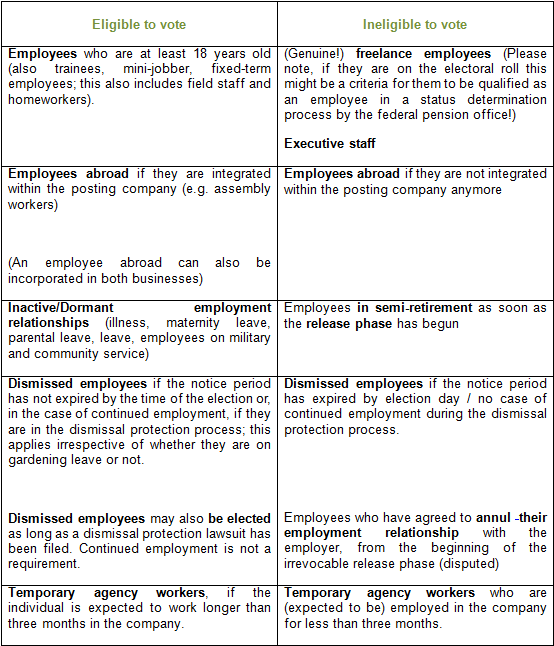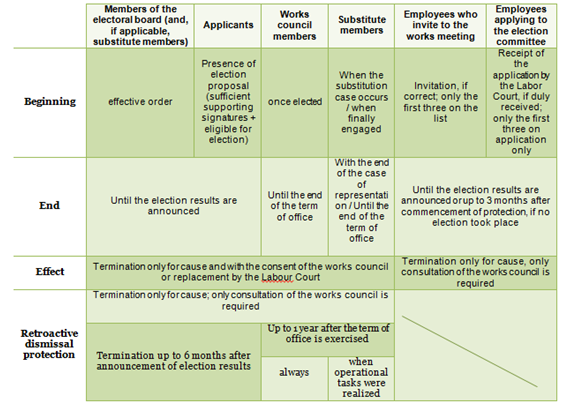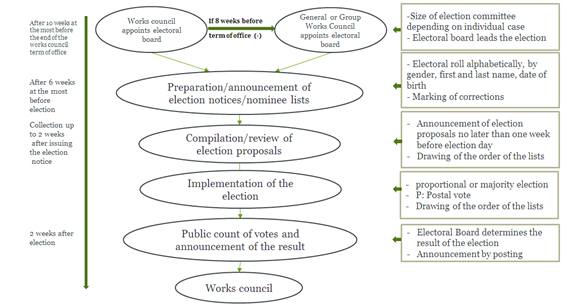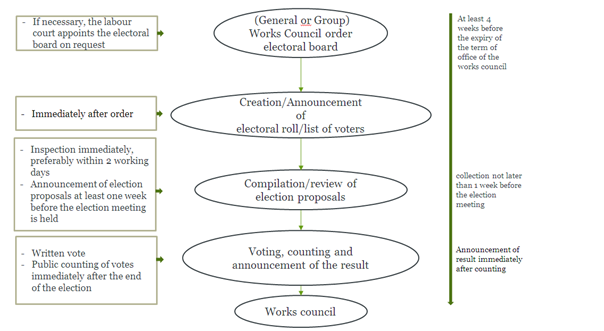Germany - Works Council Election 2018
Between 1 March and 31 May 2018, regular elections for the works council will be held. The active role of carrying out the election is primarily the responsibility of the works council or the electoral board, with the employer’s role being a rather passive one.
However, irrespective of this distribution of roles, the employer (as well as any other third party) is prohibited from influencing or hindering the works council election and there are several points that employers should take note of:
1. Where to vote?
Regular elections to the works council in companies that already have a works council typically take place every four years. In companies which do not have a works council, elections are possible at any time outside the four-year cycle in order to establish a works council for the first time.
Insofar as no agreement has been concluded (either on the basis of a collective bargaining agreement or a works agreement) providing for the formation of works councils in accordance with different structures, the works council is elected "in the workplace". The law is based on the traditional idea of a business (e. g. production site with administration buildings):
- All units are concentrated in one place and under a single management.
- Micro-entities with less than five eligible employees are allocated to the main holding.
- Parts of the business which are either remote from the main business or which are independent by area of responsibility and organisation shall be considered as a separate business.
- Employees in works sections of the company that do not have a works council may, with a majority vote, decide informally to take part in the election of the works council of the main company.
If restructuring measures were carried out in the company which had an impact on the business structure, the employer should pay special attention to taking the current structure into account. The aim is to ensure that the elections are carried out in accordance with current operating structures.
2. Who is eligible to vote?
Active voting means that the employee can vote. All employees who are at least 18 years old are entitled to vote. Passive voting means that the employee may be nominated and are eligible to be elected. This applies to all employees that are at least 18 years old, provided that they have been with the company for at least six months at the time of the election.

At the request of the electoral board, the employer has to provide a list of employees, including
- Name and surname
- Gender
- Date of birth (used to determine the active and passive eligibility for election)
- Temporary agency workers
- Identification of senior executives (and any other information that can be used to verify classification)
The electoral board will then draw up a list of eligible employees, broken down by gender.
3. Bearing the costs
The employer is obliged to bear all necessary costs of the works council election. These include material costs, costs of loss of work, training, travel expenses (if necessary to different parts of the company), legal advice and representation.
Note:
The costs of legal advice and representation may also include a dispute of which costs are to be considered as "necessary" for the preparation and implementation of the works council election. The employer has to agree to obtain legal advice before the works council may take advantage of it. It is also possible to agree upon a cap for a certain number of hours or, in the case of legal disputes, a settlement according to RVG (legal counsel fees regulation) instead of hourly rates.
4. Special protection against termination
Pursuant to §15 of the Protection against Dismissal Act (KSchG), works council members enjoy special protection against dismissal for the duration of their mandate and for one year after their post. In connection with works council elections, some additional special protection against dismissal regulations will come into effect as follows:

Note:
Care should be taken if the employer announces a restructuring shortly before the election. This can lead to disproportionately high applications for candidacy in order to obtain special protection against dismissal.
5. Normal voting procedure in businesses with more than 50 eligible employees
It is advisable for employers to keep an eye on the election process in general, in addition to the specific points described above, in order to avoid elementary mistakes in the election process as far as possible.

6. Simplified voting procedure in businesses with 5-50 persons eligible to vote

7. Contesting the election / nullity of the works council election
If a mistake in the election procedure takes place the Works Council Constitution Act (BetrVG) enables the election to be declared invalid or annulled, depending on the significance of the mistakes in question.
Invalidation can be considered if essential provisions of the electoral law have been infringed, this error has not been rectified and the error could actually affect the election result. Examples include:
- Misidentifying the definition of the business
- Admitting non-electors to the works council election
- Incorrectly calculating the works council members who can be elected.
Contesting the validity of the election is only possible within a period of two weeks after the announcement of the election results. The employer, union representatives (in the workplace) or a group of three or more employees with eligibility to vote are able to contest. Insofar as no rescission proceedings are initiated within this period, the election shall remain effective irrespective of any errors and any subsequent claims will be inadmissible.
If a court finds the works council election to be invalid, the invalidation will not have retrospective effect and all legal acts of the elected works council (e. g. enclosed works council agreements) will remain effective.
Annulment of the works council election may occur if there have been serious and obvious violations of essential election principles.
Examples in which the election can be void:
- Election of a works council in a works council-free company
- Misjudgement of the definition of business following an opposing final court decision
- Terrorisation of the workforce during the election.
A judicial review can annul a works council at any time. If a works council election is annulled (this means that a works council has never been effectively elected at any time), the company is and has been without a works council since the election and all agreements concluded with the annulled works council are invalid.
Note:
This is particularly difficult from the employer's perspective as works council agreements are required as a legal basis for actions of the employer. The most prominent example is the implementation of a mass dismissal on the basis of a severance scheme according to a list of names with privileges in accordance with § 1 para. 6 KSchG.



